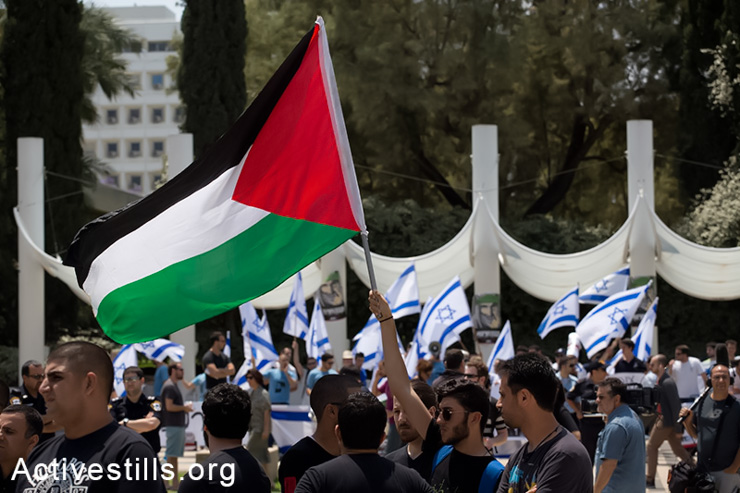Trump’s recent remarks may have sparked a debate on the possibility of the one-state solution, but one thing is for sure: Israeli Jews are not in a position to decide the future of the occupied territories.

The world works in strange ways sometimes. Who would have believed that just by mere words it would be President Donald Trump, of all people, who would grant legitimacy to the one-state solution during his joint press conference with Prime Minister Netanyahu this past week.
More than any other fictional character, Trump reminds me of Chance the gardener, the simple-minded hero of Jerzy Kosiński’s novel, Being There, whose idiotic comments are, somehow, viewed by the people around him as pearls of wisdom. Or as The Daily Show’s Trevor Noah said: “Trump is either a genius, or he’s the biggest idiot the world has ever seen.”
Quiet Palestinians, Israelis are deciding!
Trump’s mention of one state as an alternative to the two-state paradigm is no revelation — the idea has become a dominant one on the margins of the Israeli Left and the Right alike. Both sides see the territory between the river and the sea as a single geographical unit, with the central question in their eyes being the future of the Palestinian residents of the West Bank. One side believes in annexing the occupied territories without annexing the residents themselves, while the other believes that annexation means granting civil rights to all.
On the eve of the Trump-Netanyahu meeting, the latter found a new supporter: Israeli President Reuven Rivlin, who believes that the entire Land of Israel belongs to the Jews, said that “sovereignty over a territory means granting citizenship to all those in that territory. There is no way around it. There is no one deal for Israelis and another deal for non-Israelis.”
Rivlin’s remarks were so touching to Haaretz’s Gideon Levy that the latter crowned the president the “real opposition leader” who has emerged as the “only politician who speaks the truth around here.” What about Joint List Chairman Ayman Odeh? Levy has probably never heard of him. Odeh may be opposition enough to be shot by the police while defending homes from demolition in the Negev, but unfortunately he is simply not Jewish enough to play a role in the inter-Jewish public discussion that demarcates the border between the coalition and the opposition in Israel.
The point of departure among those in the Israeli “consensus” — from both the right and left — is that the fate of the occupied territories will be decided by Israel. This includes grotesque initiatives such as holding a referendum on the future of the territories (as put forth by Peace Now and the like), as well as the voices among the radical left, which support establishing a single state as a solution to the conflict.

Here might be a good point to remind the Israeli Left that the future of the West Bank and Gaza is not ours to decide, definitely not at this point. The only ones who have the right to decide are the Palestinians themselves: they can establish a secular, democratic state; an Islamic state; a socialist commune, etc. That’s their business. And it could be that they decide that the logical thing is to turn the territory between the river and the sea to a single political unit. But until then, the role of the Israeli Left is to push to end Israel’s colonial, apartheid regime in these territories using all nonviolent means at our disposal. This must be done for the sole reason of bringing about the possibility of Palestinian sovereignty.
Change starts from within
Those who truly believe in a shared land based on equality may want to begin thinking about how to implement their ideals within the Green Line, and not necessarily in the occupied territories. Not that colonialism vis-a-vis Arab society disappears inside Israel — not at all. But in the ’48 territories there is a decisive element that allows for the creation of a joint dialogue: the idea of citizenship. And while Israeli democracy is inherently based on Jewish supremacy and is therefore a pseudo-democracy, it allows (at least in theory) for a joint platform that can be leveraged to building a different political framework — one that is built on true equality for all. Or in other words, a state for all its citizens.
Instead of fantasizing about a single state, including in all the territories over whose fate we have no right to decide, we would do well to use our resources and creativity to fix the problems in our backyard — that is where the work must begin. Here, as opposed to the occupied territories, is where we have a mandate as citizens to influence its character. This may be less sexy than talking about a “solution to the Israeli-Palestinian conflict” but in some ways it is even more critical — especially in light of the state’s war on Israel’s Palestinian citizens, a war that continues to escalate through home demolitions, arrests, suppression of political leaders, etc.
Want an equitable and democratic country? Great, let’s start building it from the ground up inside the state borders. And one day, when we replace Jewish ethnocracy with a state for all its citizens and do away with Israeli colonialism in the occupied territories, maybe then we can sit with our Palestinian neighbors as equals and talk about the possibility of a shared future. Until then, the entire idea of annexing the West Bank — with or without granting citizenship to its Palestinian residents — is just another expression of Jewish supremacy and the perpetual, patronizing blindness that it creates.
This article was first published in Hebrew on Local Call. Read it here.

